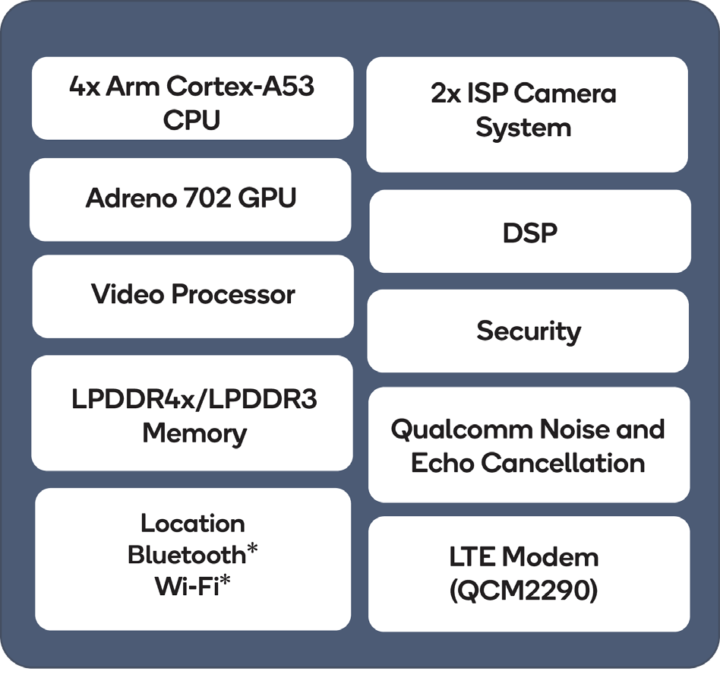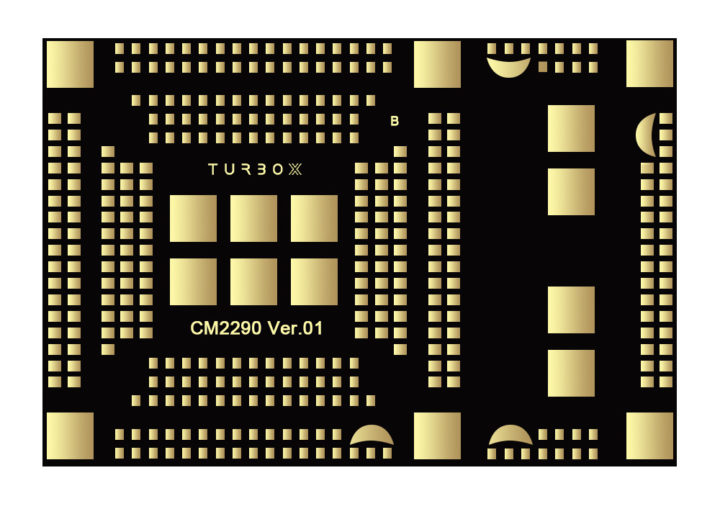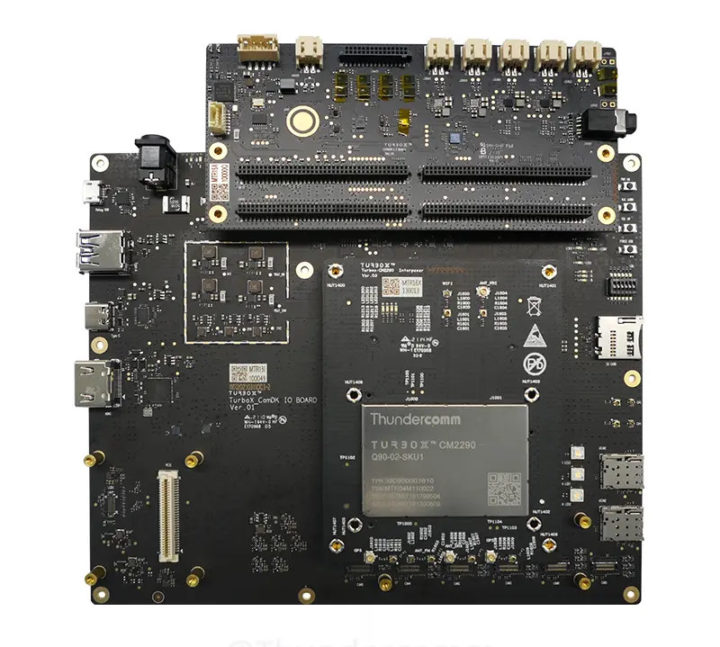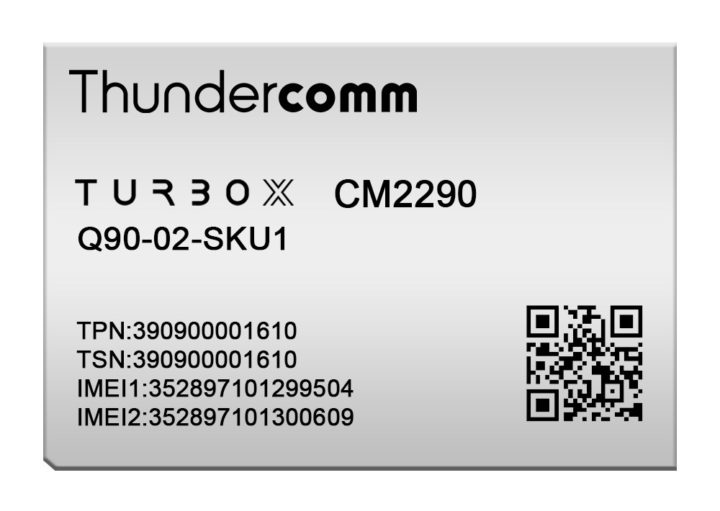Last June, Qualcomm introduced several industrial IoT solutions that we did not cover at the time with Qualcomm QCM2290/QCS2290 IoT chip for camera applications, industrial handhelds, retail and tracking, Qualcomm QCS8250 WiFI 6 & 5G SoC for connected healthcare, digital signage, retail, and video collaboration, Qualcomm QCS6490/QCM6490 WiFI 6E & 5G SoC for connected healthcare, logistics management, retail, transportation, and warehousing, and Qualcomm QCS4290/ QCM4290 designed for cameras, industrial handhelds, and security panels with 4G LTE and WiFi 6 connectivity.

Shortly after Qualcomm’s announcement, Thundercomm introduced the TurboX C2290/CM2290 system-on-module respectively based on Qualcomm’s quad-core Cortex-A53 QCS2290 SoC and QCM2290 SoC adding 4G connectivity. The module also offers WiF & Bluetooth, as well as MIPI display & camera interfaces, and the TurboX CM2290/C2290 development kit is also available to get started.
TurboX CM2290 and C2290 SoM
- SoC – Qualcomm Snapdragon QCM2290 or QCS2290 quad-core Cortex-A53 processor at up to 2.0 GHz with Adreno 702 GPU, Hexagon QDSP6 v66 DSP
- System Memory – 2GB or 3GB LPDDR4x
- Storage – On module 16GB eMMC flash, SD card interface
- Display Interface – 1x 4-lane MIPI-DSI up to 1680 × 720 @ 60fps (HD+)
- Camera Interface
- 2x MIPI-CSI, 4 + 4 or 4 +2+1, D-PHY 1.2 at 2.5 Gbps per lane
- 2x ISP (13 MP + 13 MP or 21MP) at 30 fps ZSL
- Video
- Encode – 1080p30fps H.265/H.264
- Decode – 1080p30fps H.265/H.264/VP9
- Audio – 1x Soundwire, I2S, 4x DMIC
- Connectivity
- Wi-Fi 6 802.11a/b/g/n/ac
- Bluetooth 5.0
- CM2290-EA (for EMEA region) only
- 4G LTE cellular connectivity
- Cat4 DL/Cat5 UL
- Frequency bands
- FDD: B1 / B2 / B3 / B5 / B7 / B8 / B20 / B28(A+B)
- TDD: B38 / B39 / B40 / B41
- WCDMA – B1 / B2 / B5 / B8
- GSM – 850/900/1800/1900 MHz
- 4G LTE cellular connectivity
- GNSS
- CM2290-EA (EMEA) – GPS, Glonass, BeiDou, Galileo, QZSS, and SBAS
- C2290 (Global) – Reserve GNSS_IQ to extend support Qualcomm WGR7640
- USB – 1x USB 3.1
- Other peripherals – 8x QUP (Qualcomm Universal Peripheral) aka SPI, 2 x UIM; GPIOs
- LGA package dimensions
- CM2290-EA (EMEA) – 51 x 35 x 2.9mm
- C2290 (Global) – 34 x 35 x 2.9mm
- Temperature Range – -20 ~ 70
- Compliance
- RoHS/REACH/WEEE/HF
- CM2290-EA (EMEA) – CE
- C2290 (Global) – FCC/CE/IC/KC/JATE/TELECA

TurboX CM2290/C2290 development kit

- System-on-Module – ThunderX CM2290/C2290 SoM
- Storage – SD card slot
- Display Interfaces
- MIPI DSI D-PHY for optional 5-inch TFT-LCD display with touchscreen
- 1x HDMI Out
- Camera Interfaces – 2x MIPI-CSI connectors with support for OV13B10 (13MP) and IMX577 (12.3MP) camera sensors
- Audio – 1x 3.5mm headset jack, 4x digital Mics, 1x Line out with PA, 1x EAR out with PA
- Connectivity
- 4G LTE, WiFI, Bluetooth on-module + on-carrier SIM card slots
- NFC support
- 2x LTE antennas; 1 x Wifi/Bt antenna; 1x GNSS antenna
- USB -1x USB 3.1 Type C, 1x Micro USB for UART Debug
- Expansion – I/Os with PWM, CAN bus, 1x UART for RS232/RS485,
- Sensors – ALS/proximity sensor, accelerometer & gyro sensor, magnetic sensor, pressure sensor
- Misc -RTC plus battery connector
- Dimensions – 185 x 150 mm
The standard kit sells for $699 with an interposer board with CM2290-EA SoM, a sensor board, a main I/O board, two LTE Antenna, one GPS Antenna, and aWi-Fi/BT antenna. plus a camera module with an FPC cable, and a power adapter. The 5-inch LCD display adds an extra $150.
More details including product pages for the module and devkit. The latter includes more documentation, but some of the resources like user guides and Android/Linux SDK user manuals require registration.
Via LinuxGizmos

Jean-Luc started CNX Software in 2010 as a part-time endeavor, before quitting his job as a software engineering manager, and starting to write daily news, and reviews full time later in 2011.
Support CNX Software! Donate via cryptocurrencies, become a Patron on Patreon, or purchase goods on Amazon or Aliexpress





